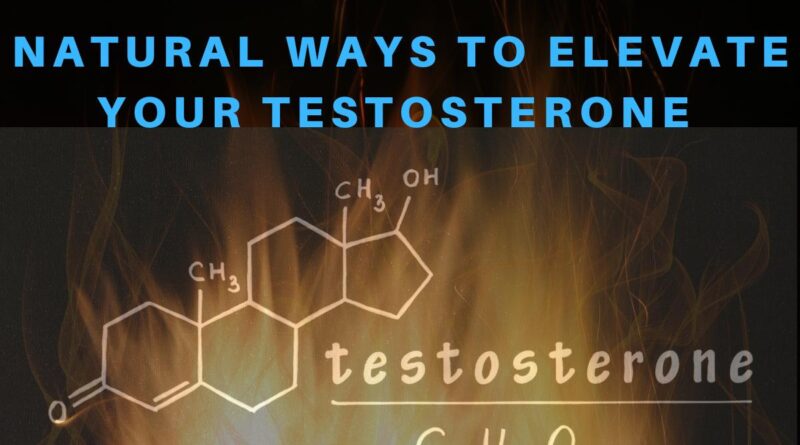Testosterone Tune-Up: Natural Ways to Elevate Your Vital Hormone Levels
Introduction
Testosterone, often hailed as the cornerstone of male vitality, orchestrates a symphony of functions within the human body. Its influence extends from sculpting muscles to fortifying bone density. Beyond the physical realm, maintaining optimal testosterone levels is not just a biological necessity but a key player in achieving a balanced and energetic life. This article embarks on a journey to unravel natural approaches that can significantly boost testosterone levels, zeroing in on lifestyle changes that wield a positive impact on this vital hormone.
1. The Significance of Testosterone
Understanding the central role testosterone plays in overall health and well-being is paramount. Beyond its stereotypical association with masculinity, testosterone contributes to cognitive function, cardiovascular health, and mood regulation. It acts as a linchpin in the intricate machinery of human physiology.
2. Exercise and Testosterone
Delving deeper into the symbiotic relationship between regular exercise, particularly resistance training, and the stimulation of testosterone production. Unveiling the science behind compound exercises like squats, deadlifts, and bench presses that emerge as potent catalysts in the testosterone-boosting process.
3. Quality Sleep and Hormonal Balance
Navigating the realm of quality sleep and its profound impact on hormonal equilibrium. Providing nuanced recommendations for achieving an optimal sleep duration that not only revitalizes the body but also supports a delicate hormonal balance.
4. The Impact of Diet on Testosterone
Amplifying the discourse on the intricate link between a balanced diet and healthy testosterone levels. Shedding light on the significance of nutrient-rich foods and supplements, with a detailed exploration of specific dietary elements that foster an environment conducive to robust testosterone production.
5. Stress Management Techniques
Peering into the shadowy corners of chronic stress and its detrimental effects on hormone levels. Offering a toolbox of practical stress-reducing techniques such as meditation and yoga, empowering individuals to navigate life’s challenges while safeguarding their hormonal well-being.
6. Moderation in Alcohol and Caffeine Consumption
Weighing the impact of excessive alcohol and caffeine intake on hormonal equilibrium. Advocating for moderation as the key to preserving stable testosterone levels and overall health.
7. Harnessing the Power of Sunlight
Unearthing the connection between Vitamin D, sunlight exposure, and the pivotal role they play in testosterone production. Encouraging readers to bask in the sun or consider Vitamin D supplements, especially when sunlight exposure is limited.
8. Body Weight and Hormonal Harmony
Unraveling the intricate link between body weight and testosterone levels. Emphasizing the pivotal role of maintaining a healthy weight through a balanced diet and regular exercise in nurturing hormonal harmony.
9. The Role of Endocrine Disruptors
Educating readers about the potential threat posed by certain chemicals to hormone production. Proposing actionable steps to limit exposure to endocrine disruptors, advocating for a shift towards natural, chemical-free products.
10. Aging and Testosterone Decline
Navigating the inevitability of testosterone decline with age. Proposing a roadmap for mitigating this natural decline through the adoption of a healthy lifestyle, ensuring that the golden years are marked by vitality and well-being.
11. Lifestyle Changes for Optimal Hormone Levels
Summarizing the transformative lifestyle changes discussed throughout the article. Reinforcing the idea that a holistic approach to health not only enhances testosterone production but also contributes to overall well-being.
12. The Influence of Testosterone on Mental Well-being
Exploring the often-overlooked connection between testosterone levels and mental health. Discussing how optimal hormone levels can positively impact mood, cognitive function, and overall mental well-being.
13. Testosterone and Cardiovascular Health
Shedding light on the correlation between testosterone levels and cardiovascular health. Discussing how maintaining a healthy balance of testosterone may contribute to a healthier heart.
14. Testosterone-Boosting Recipes
Introducing readers to recipes that incorporate ingredients known to support testosterone production. From nutrient-packed smoothies to testosterone-boosting meal ideas, practical suggestions for a hormone-friendly diet.
15. The Future of Testosterone Research
Offering a glimpse into ongoing research on testosterone and its potential implications for future health. Exploring emerging trends, innovations, and possibilities in the field of hormonal health.
In conclusion, while the natural decline of testosterone with age is inevitable, the power to influence and support optimal hormone levels lies within the choices we make daily. By embracing the natural strategies outlined in this article, individuals can embark on a journey to not only elevate testosterone levels but also to enhance their overall quality of life.
Frequently Asked Questions (FAQs)
What supplements are most effective in supporting testosterone production?
- Several supplements are known to support testosterone production. Vitamin D, zinc, and Omega-3 fatty acids are particularly beneficial. Additionally, herbal supplements like ashwagandha and fenugreek may also contribute to hormonal balance.
Are there specific exercises that boost testosterone levels more than others?
- Yes, certain exercises are highly effective in stimulating testosterone production. Compound exercises such as squats, deadlifts, and bench presses are particularly noteworthy. High-intensity interval training (HIIT) and resistance training also play a significant role in elevating testosterone levels.
At what age does testosterone production typically start to decline?
- Testosterone production typically starts to decline around the age of 30. However, the rate of decline can vary among individuals. Lifestyle factors, genetics, and overall health play crucial roles in influencing the pace of this decline.
Can women benefit from the same lifestyle changes to support hormone balance?
- Yes, many lifestyle changes that support testosterone balance are applicable to women as well. While women have lower testosterone levels than men, maintaining hormonal balance through regular exercise, a balanced diet, and stress management can positively impact overall well-being.
Are there any side effects associated with natural approaches to boost testosterone?
- Generally, natural approaches to boost testosterone, such as exercise, a healthy diet, and stress management, have minimal side effects when practiced in moderation. However, it’s essential to consult with a healthcare professional before making significant lifestyle changes, especially if you have pre-existing health conditions or are considering the use of supplements. Individual responses to lifestyle changes may vary.
These answers aim to provide insights into common concerns related to testosterone and offer guidance for those looking to enhance their hormonal balance naturally.











Pingback: The Secrets of Sexual Triggers: Awaken Desire with Body Language. - American Fit Life